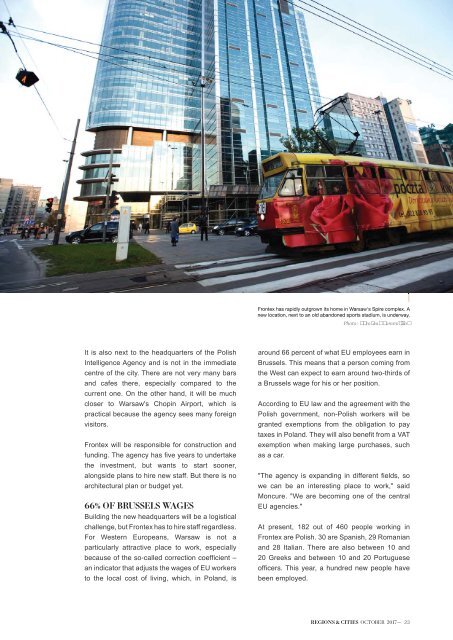Regions & Cities: The EU Agencies Race
EUobserver's 2017 Regions & Cities magazine takes a closer look at EU agencies and the benefits for cities and regions to host them. The UK leaving the EU has prompted a scramble for the European Medicines Agency and the European Banking Authority among most of the remaining member states. But what makes a city competitive? Which cities stand a good chance to become the new hosts? And what do EU agencies bring to the local economy?
EUobserver's 2017 Regions & Cities magazine takes a closer look at EU agencies and the benefits for cities and regions to host them. The UK leaving the EU has prompted a scramble for the European Medicines Agency and the European Banking Authority among most of the remaining member states. But what makes a city competitive? Which cities stand a good chance to become the new hosts? And what do EU agencies bring to the local economy?
Create successful ePaper yourself
Turn your PDF publications into a flip-book with our unique Google optimized e-Paper software.
Photo: roeaommiio<br />
It is also next to the headquarters of the Polish<br />
Intelligence Agency and is not in the immediate<br />
centre of the city. <strong>The</strong>re are not very many bars<br />
and cafes there, especially compared to the<br />
current one. On the other hand, it will be much<br />
closer to Warsaw's Chopin Airport, which is<br />
practical because the agency sees many foreign<br />
visitors.<br />
Frontex will be responsible for construction and<br />
<br />
the investment, but wants to start sooner,<br />
alongside plans to hire new staff. But there is no<br />
architectural plan or budget yet.<br />
66% OF BRUSSELS WAGES<br />
Building the new headquarters will be a logistical<br />
challenge, but Frontex has to hire staff regardless.<br />
For Western Europeans, Warsaw is not a<br />
particularly attractive place to work, especially<br />
<br />
an indicator that adjusts the wages of <strong>EU</strong> workers<br />
to the local cost of living, which, in Poland, is<br />
around 66 percent of what <strong>EU</strong> employees earn in<br />
Brussels. This means that a person coming from<br />
the West can expect to earn around two-thirds of<br />
a Brussels wage for his or her position.<br />
According to <strong>EU</strong> law and the agreement with the<br />
Polish government, non-Polish workers will be<br />
granted exemptions from the obligation to pay<br />
<br />
exemption when making large purchases, such<br />
as a car.<br />
<br />
we can be an interesting place to work," said<br />
Moncure. "We are becoming one of the central<br />
<strong>EU</strong> agencies."<br />
At present, 182 out of 460 people working in<br />
Frontex are Polish. 30 are Spanish, 29 Romanian<br />
and 28 Italian. <strong>The</strong>re are also between 10 and<br />
20 Greeks and between 10 and 20 Portuguese<br />
<br />
been employed.<br />
REGIONS & CITIES OCTOBER 2017— 23

















